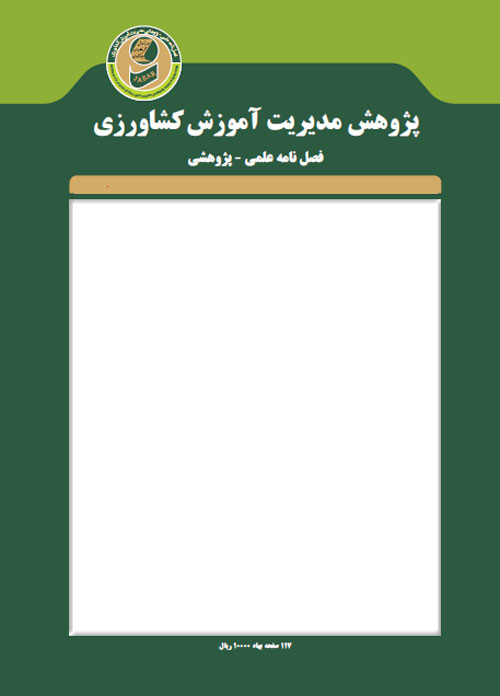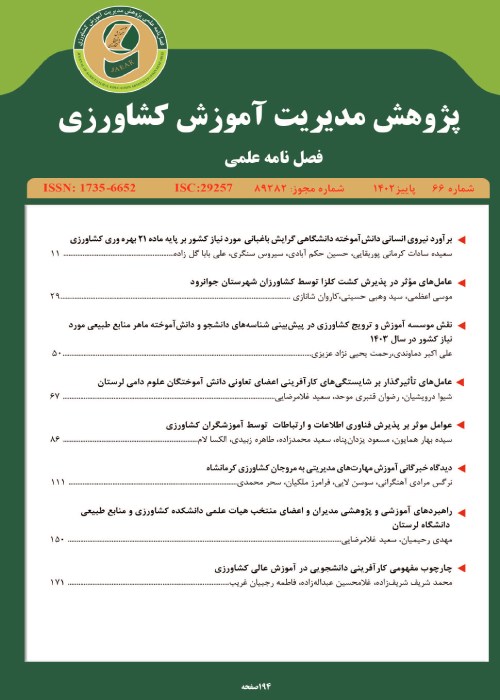فهرست مطالب

نشریه پژوهش مدیریت آموزش کشاورزی
سال ششم شماره 28 (بهار 1393)
- تاریخ انتشار: 1393/03/10
- تعداد عناوین: 10
-
-
Page 3The objective of this research was to analysis process of human resource management development in agricultural small and medium enterprises. Statistical population of the study consisted of 560 managers of agricultural small and medium enterprises in Kermanshah Province out of which 96 managers randomly selected as sample using Cochran formula and proportionate stratified sampling technique. Data were collected by applying a questionnaire developed for the study and were analyzed using SPSS win and LISREL. Validity of the questionnaire was approved by a panel of experts. In order to measure the reliability of the questionnaire، Cronbach Alpha coefficient was calculated (α= 0. 91). Results of prioritizing human resource management development process showed that the two most important mechanisms were increase in salary of employees and recruitment of experienced employees based on necessary job competencies. To identify the components of HRMP، exploratory factor analysis was applies. Also، in order to investigate the model fitting indexes، confirmatory factor analysis and structural equations modeling was used. The results showed that HRMP are consisted of five factors including: infrastructure - support، management، information technology، motivation and education that explained about 67. 10 percent of variations of these strategies.Keywords: Agricultural Small, Medium Enterprises, human resource development, human resource management
-
Page 16This descriptive-correlational research was done to investigate the relationship between organizational intelligence and organizational learning in Bushehr Agriculture Education Center and Agricultural and Natural Resources Reasearch Center. The statistical population of research consisted of all experts of the two Centers (N=118). By using random sampling technique and applying Cochran formula، 70 experts were randomly selected as research sample. Tools for data collection were standardized questionnaire of Organizational Intelligence (Albrecht، 2003) and Measuring Organizatonal Learning Questionnaire (Lorraines، 1997). Reliability of the questionnaire was confirmed based on Cranach’s alpha coefficient which ascalculated as α=0. 82-0. 42 for two main parts of the questionnaires، respectively. The results showed that there is significant difference between organizational learning in the Education Center and Research Center at P=0/05. Also، findings showed that there is a positive significant correlation between all components of organizational intelligence and organizational learning at P= 0/01. So، there is a strong relationship between the pressure of performance and organizational learning. Also، there is a significant relationship between desire to change، unity and agreement، common، the spirit of enterprise، applied science and perspective strategic vision and organizational learning.Keywords: Organizational intelligence, organizational learning, Agricultural Research Center, Jihad Agriculture Education Center
-
Page 28Incorporating aspects of sustainability with higher education is essential for students so they are aware of the impact of lifestyle on environmental degradation and also، the understanding the relationship between environmental، economic and social effects with their own actions as local and global citizens. The aim of this study is to review behavior and attitudes of students toward sustainable development and factors affecting it. The statistical population was 270 graduate of Shiraz University Agricultural College. This study was a survey and in order to select the sample a two-stage random sampling procedure was applied. The sample size was determined as of 155 students. Questionnaire was used to collect data. The results showed that students'' attitudes towards the importance of sustainable development has been positive and their behavior is also stable. There is a significant relationship between gender and their attitudes toward sustainable development. Results of the Pearson correlation showed that there is a significant relationship between attitude towards the future sustainability of the environment with attitudes sustainable and behavior of students.Keywords: Sustainable development, student's attitude, sustainable behavior, environmental sustainability
-
Page 38This cause- effect study conducted to investigate the role of social capital dimensions in the educational performance of faculty members of agricultural colleges at the west part of Iran. The statistical population of this study was consisted of all faculty members in the agricultural colleges of universities of Ilam، Razi and Kurdistan (N=137). Using Patten sampling table، 116 faculty members were selected as the research sample selected through proportionate stratified random sampling method (n=116). The main instrument of study was questionnaire included four latent variables as: cognitive social capital، structural social capital، relational social capital and educational performance. Data was analyzed applying SPSSWin21 and LISREL8. 80. Results of confirmatory factor analysis (CFA) confirmed the validity، reliability and fitness of latent variables. Results of structural equation modeling showed that social capital dimensions (structural، relational and cognitive) had positive and significant effects on educational performance of the faculty members. Results from this study have applications to contribute to higher agricultural education system policy makers، planners and mangers، in order to improve the educational performance among faculty members of agricultural colleges.Keywords: Structural social capital, relational social capital, cognitive social capital, educational performance, agriculture education
-
Page 52The main purpose of this study was to assess the impact of extension education on greenhouse management from the view of Pakdasht educated Greenhouse owners. It is based on information collected from survey and a researcher-made questionnaire. The face validity (based on expert opinion) and reliability (Coronbach Alfa coefficient) were established for the questionnaire. The statistical population consisted of 850 greenhouse owners of ornamental plants in Pakdasht County and the sample size was determined by Cochrane formula (n= 117) through a random sampling technique. SPSS was used to analyze data. Correlation analysis showed significant and positive relationship between the variables of content and methods of educationa extension with management of greenhouses. In addition، the results of multiple regressions showed that content and methods of extension education had a positive impact on greenhouse management.Keywords: Greenhouse owners education, Greenhouse management extension
-
Page 62Cooperatives and education have always been complementary to each other such that without the latter no cooperative could achieve success in long term. On the other hand، conventional education is not believed to be an efficient way of updating cooperative members vocational performance. Electronic learning could be helpful in removing the problems attached to conventional education. The purpose of this study was to determine effective factors that positively improve electronic learning in Zanjan agricultural cooperatives. The study was descriptive in which a random sample of 80 managers of agricultural cooperatives in Zanjan province were selected through cluster sampling method، using Cochrane formula. Questionnaire was prepared to collect data. Results of factor analysis indicated that four factors، namely: thrift and self-effectiveness favorable knowledge and outlook indigenous-specific material content and education and interaction were the most influential factors، among others، to improve quality of electronic learning. The four factors totally explained 60. 9% of E-learning variance.Keywords: Education quality, agricultural cooperative, E, learning, educational factors
-
Page 72The purpose of this research is to investigate (path analysis) factors affecting teachers job satisfaction in Mazandaran Agricultural High Schools. This research is a cause-correlational. The statistical population consisted of 127 agricultural teachers. Sample size was determined using Cochran formula and 85 teachers were selected. The research instrument was questionnaire and its content validity was measured by a group of extension specialists. In order to investigate reliability of research questionnaire، 29 teachers were randomly selected and completed the questionnaires. Also، Cronbach alpha، ordinal theta and combination reliability were calculated as α= 0. 95، θ= 0. 92 and CR= 0. 87. Results indicate that the level of job satisfaction (85% of agricultural high school teachers) is at moderate and high level. Also، variables of environmental factors، motivational factors، educational factors، organizational factors، hygiene factor and job trait have significant positive correlation with job satisfaction; Based on the results of stepwise regression analysis، 44. 8% of job satisfaction variance determined by four variables as; environmental factor، motivational factor، educational factor and organizational factor. Modeling، the highest effect on teachers job satisfaction was impacted by educational factor with the path coefficient of 0. 512.Keywords: Job satisfaction, agricultural teacher, agriculture high school
-
Page 83One of the most important challenges in rural development is rural youth unemployment. Entrepreneurship as a new movement، can handle the problem among rural youth. Thus، investigating entrepreneurship among rural youth can help to rural development agents understand this issue in rural communities. Analysis of factors effecting entrepreneurial attitudes of rural youth were the main purpose of this study. Rural youth (the age of 20 to 34) in Mashhadbylo village in Fars Province were 1034 who provided the statistical population of this research from this 136 youth was determined as research sample by Cochran formula. A researcher made questionnaire was implemented to collect data. Validity of this questionnaire was confirmed by a panel of experts. Cronbach alpha was ranged from α=0. 74، 0. 93. Rural youth were classified in four groups based on the level of their response to the dependent variable (entrepreneurial attitude). Analyzing independent variables; direct and indirect effects on the dependent variable were determined by path analysis. Showed، 35. 1% of entrepreneurial attitude variance was explained by independent variables. According to the findings، the subjective norms variable had the highest effect on entrepreneurial attitude of rural youth.Keywords: Entrepreneurial attitude, rural youth, rural entrepreneurship, subjective norms
-
Page 95Factors influencing learning are varied and identifying these factors is important in addressing shortcomings of the educational systems. One of these factors is learning styles. Teachers'' knowledge of students'' learning styles is effective in teaching diversity as well as in facilitating students learning. This study aimed to investigate the relationships between learning styles and self-efficacy and educational progress of agriculture students in the college of Agriculture، Kerman University. This is a descriptive - correlational study and a questionnaire was provided to collect the required data. Statistical population of this study consisted of first، second and third year student in four-yaer duration B. S. c in college of agriculture، of Shahid Bahonar University of Kerman. Using a multistage stratified random sampling، a number of 216 students selected to be studied. Validity of research instrument was approved by a panel of experts and preliminary test was used to determine reliability of the research instrument and Cronbach alpha indicated the appropriate reliability of data collection. Data analysis was performed using SPSS، version 18. Results showed significant difference between educational progress of students with accommodating learning style and students with diverging learning style، with the in higher educational progress for the former learning style. Also Results showed that there was a significant difference between educational progress of students with converging learning style and diverging learning style، in their higher educational progress. Results showed a significant and positive relationship between individual self-efficacy and educational progress of students.Keywords: self, efficacy, learning style, educational progress, Agricultural Students
-
Page 106The purpose of this study was to investigate the barriers to job empowerment of Zanjan University agriculture graduates. Statistical population of the study consisted of 201 graduates from that 101 graduates were randomly selected. Validity of the questionnaire was approved by a panel of academic experts. Cronbach alpha coefficients used to measure the research instrument reliability (α=0. 87). Results showed that the average score of occupational empowerment of respondents was 7. 04 out of 20 that indicating their weak stance. Using exploratory factor analysis، barriers to empowering agricultural graduates were classified in to eight factors including: non-functional courses، cultural and attitudinal barriers، quantitative development of agricultural higher education with poor industrial relations، content not appropriate to respond the needs of agricultural sector، inappropriate evaluation and the lack of government support and poor student self-reliance. Close to 70% of the total variance of barriers to empowering agricultural graduates was explained by these eight factors.Keywords: Graduates employment, agricultural higher education, agricultural employment, graduates job empowerment


